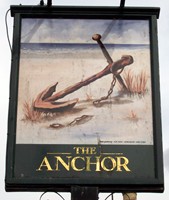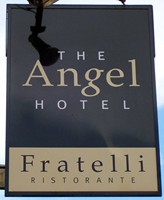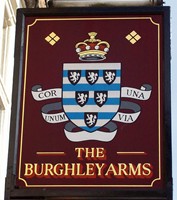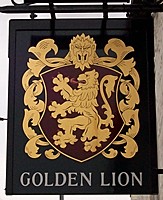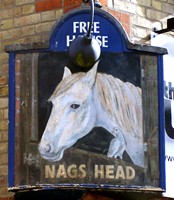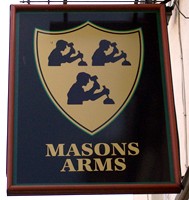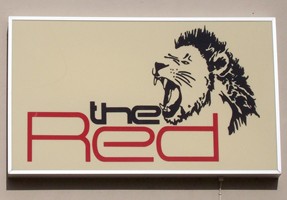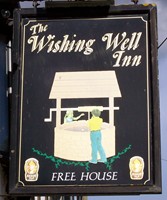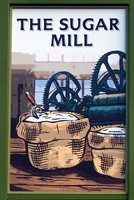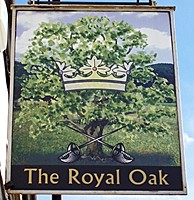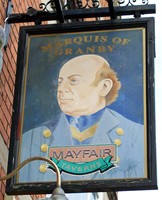|
Public house signs in Bourne
THE ANCHOR in Eastgate has a name which reflects its maritime connections because during the 18th and 19th centuries the Bourne Eau which runs past the rear of the premises was a navigable waterway with boats plying a coastal trade from the North Sea and mooring along the banks which were filled with wharfs to service the various warehouses, so providing the hostelry with a regular custom from seagoing mariners. THE ANGEL HOTEL in North Street dates from the 18th century and was originally the Nag's Head Hotel changing its name circa 1800. In earlier times, the Angel had a religious connotation, catering for travellers of a devout nature, perhaps visiting the monastery, the language of the sign which showed an appropriate picture being universal in an age when few people could read or write. THE BURGHLEY ARMS in North Street refers to William Cecil who was born here in 1520 and rose to become the first minister and trusted adviser to Queen Elizabeth I and later the first Lord Burghley, the sign depicting his family's coat of arms. FIRKIN ALE in North Street opened in 2006 in converted shop premises using one of the more whimsical pub names that have become popular in recent years, firkin being a Middle English word now fallen into disuse meaning a small wooden barrel or keg for storing beer, usually one fourth of a standard barrel or nine gallons. THE GOLDEN LION in West Street is one of a series of animal names which were popular as inn signs throughout England, the majority stemming from coats or arms or heraldic badges of royal and prominent families, hence the ornate nature of the design. THE JUBILEE GARAGE in North Street is named after the garage which once operated from these premises, the name being uncovered on the frontage during restoration work. It had been so named in 1935 because it was opened soon after King George V and Queen Mary had celebrated their Silver Jubilee. When the bar premises were completed in 2006, the new owner thought the name of sufficient interest to retain it as The Jubilee but this was changed in April 2012 to the Jubilee Garage and a motoring theme was introduced for the interior. THE MASON'S ARMS in South Street refers to the trade of the stonemason and is one of many signs which commemorate trade associations and their crests although the majority have disappeared from our daily life. THE NAG'S HEAD in Abbey Road dates from the early 19th century and assumed the name the Nag's Head Hotel after it had been discarded by the Angel Hotel across the road around 1800 although this has been shortened in recent years to just the Nag's Head, a name that reflects the Englishman's affection for the horse in this agricultural community although it has been interpreted in some districts as meaning a shrewish wife. THE RED LION in South Street is again a popular animal association which had its origins in heraldry and mediaeval folklore and is one of the most popular pub names in England today. The present sign on the Red Lion in South Street, however, is a modern and incongruous replacement and does not reflect this tradition. SMITH'S OF BOURNE in North Street was chosen by the owners when the grocery shop premises in North Street were converted into a public house in May 2002 to remember John Smith and his family who ran the business from 1857 until 1998 while the old enamelled advertising signs from past times have been retained on the frontage. THE WISHING WELL is actually in Dyke village but is within the parish of Bourne. The original public house on this site was called the Crown but the premises were greatly altered and re-opened in 1973 under its present name after a well twenty feet deep was found during rebuilding work and has been retained as a feature of the new inn. Since then the business has expanded even more to become one of the largest and busiest pubs and restaurants in the locality. THE SUGAR MILL is Bourne's most modern public house and was opened in South Road in December 2012 by a leading British company, Marstons plc, as part of a garage/pub-restaurant development on the site. It is the largest public house of its kind in Bourne and in view of the extensive bar and restaurant facilities is likely to attract a busy trade from the town and district.
REVISED SEPTEMBER 2013 Return to Inns and hostelries
Go to: Main Index Villages Index
|
||||||||||||||||||||||||||
